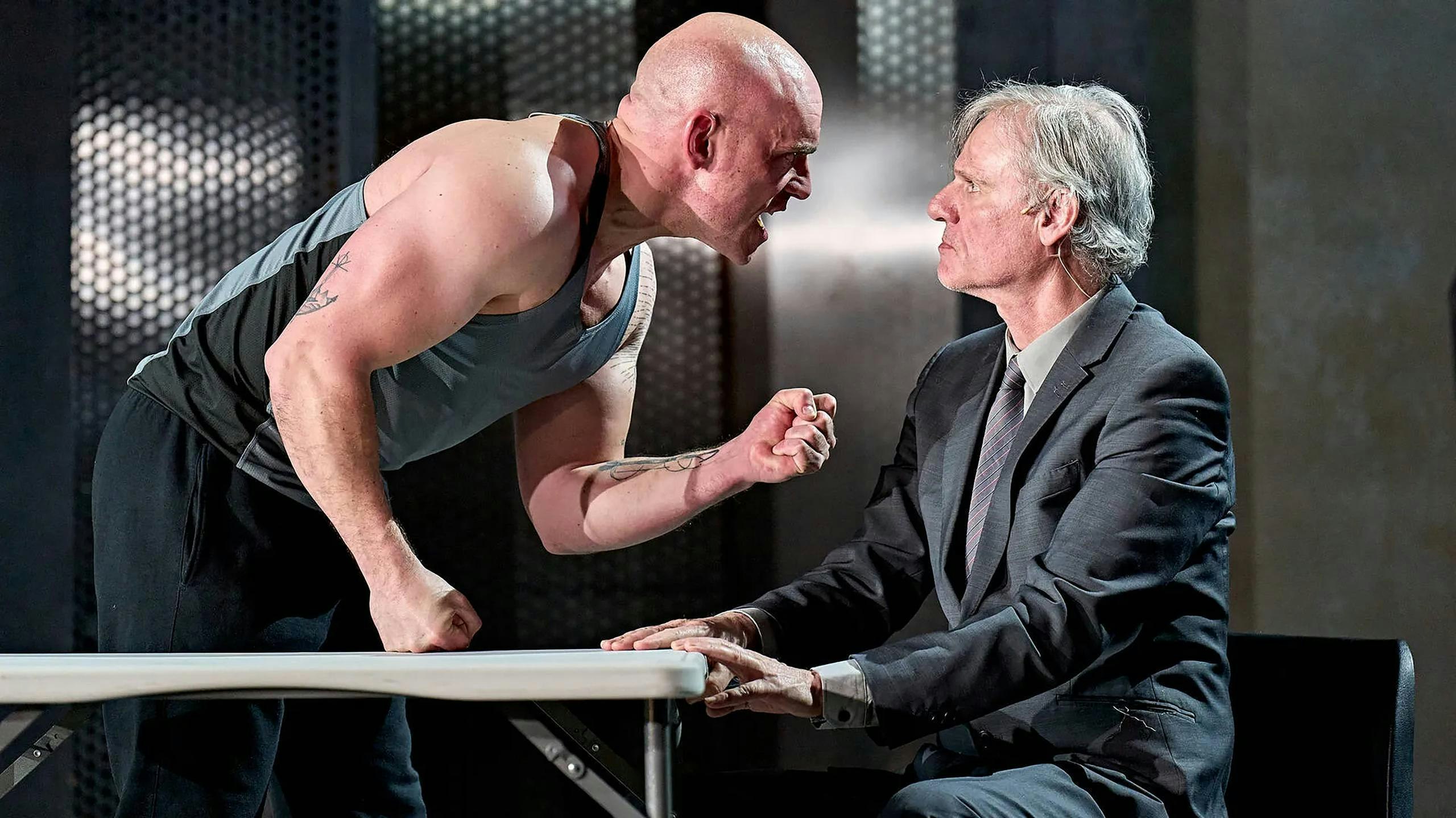This article is taken from the May 2025 issue of The Critic. To get the full magazine why not subscribe? Right now we’re offering five issues for just £10.
There are few major news stories that begin as tragedy and end as farce, but the saga of Raoul Moat defied tradition. In the summer of 2010, Moat, a former nightclub bouncer, was released from HMP Durham, where he had served a short sentence for assaulting a child, and set out on an aimless mission of revenge.
Within a few days, he had critically injured his former girlfriend, killed her new partner, blinded a police officer and somehow evaded the largest manhunt of modern times for nearly a week. It was a gripping, terrifying saga. And then Paul Gascoigne turned up, bearing fishing rods and a chicken, and demanding to see “My mate, Moaty”.
Robert Icke’s new play, which is premiering at the Royal Court before a near-certain West End transfer, brings Gazza, or at least the actor Trevor Fox’s portrayal of him, onto the stage late in the second half.
As expected, his sudden advent gets a big, if rather shocked, laugh, breaking as it does the sombre mood that has been growing in intensity and darkness over the previous hour or so. However, those who are expecting a recipe for poulet à la Gazza may be disappointed.
Over the course of the imagined conversation that the two men have — in reality, Gascoigne, who was drunk and high on cocaine, did not know Moat and had arrived purely at random — they discuss their respective failings and the unfairness of the social pressures placed upon them and reach the same conclusion.
Both men — one a has-been footballer, the other a never-was criminal and murderer — are victims of society because they were born male in an age where traditional displays of machismo are frowned upon and expressing one’s emotions is even worse. That leaves little way out for anyone whose life is not a straightforward breeze to success.

Icke is a thoughtful and intelligent director, whose recent work (including an Olivier Award-winning version of Oedipus with Mark Strong and Lesley Manville and his Henry IV adaptation, Player Kings) has also explored aspects of toxic masculinity, albeit in more detached form.
He has built his reputation on re-examining and often subverting the tropes of classical drama, which makes this foray into contemporary events something of a volte face for him. Nevertheless, working from his own text, Icke attempts the near impossible — to make the audience feel sympathy for this particular devil.
In Samuel Edward-Cook’s primal, at times terrifying performance, Moat is presented less as a Mephistophelian figure than as an inarticulate and muscled lump who is described at one point, not inaccurately, as “Frankenstein’s monster with a sawn-off shotgun”.
Moat also serves as the Geordie-accented, semi-reliable narrator of his own story. It is testament to Edward-Cook’s charismatic appeal that, for a while, his anti-hero genuinely does come across less as a villain and more a brute who has been wronged by an unholy mixture of situation, circumstance and the Northumbria Police, who do not emerge well here.
Then around halfway through, Icke makes the characteristically bold decision to extinguish all the Royal Court’s lighting to offer an account of PC David Rathband’s suffering at the hands of the killer.
Rathband was blinded when Moat, in a rage at the wider police forces who were not “taking me seriously enough”, randomly shot his vehicle. The police officer, who never recovered from his injury, committed suicide 18 months later. As the audience sits, immersed in darkness, listening to this man’s painful words, empathy for Moat drains away, to be replaced by justifiable horror at his crimes.
The show runs a tight 100 minutes. If it were any longer it would be unbearable, such are the levels of tension and intensity.
Technical credits are impeccable, especially Hildegard Bechtler’s design, which begins as an Orwellian steel-and-aluminium prison for Moat to pace endlessly around, interrogated and frustrated by various forces of bureaucracy and the law, and ends as a grim depiction of the rural wasteland where he makes his final stand, with only a couple of wastrel accomplices to cheer him on, before a police negotiator and the imagined Gazza step in to do their bit.
Although this isn’t an actors’ showcase, Edward-Cook does a commendable job at making Moat’s primal rage at least comprehensible, if never defendable, and Angela Lonsdale registers effectively in a range of roles that allow her to represent the forces of an uncaring, cold legislature that is intent on keeping Moat down at all costs.
Manhunt makes great play of newly elected PM David Cameron’s comment that “Raoul Moat was a callous murderer. Full stop. End of story.” Icke’s intention, and one I’m not sure that he entirely nails, is to suggest that Moat’s actions stem less from motiveless malignity and more from the frustrations that an uneducated, violence-prone man from a depressed area of North-East England is inevitably subject to. (Icke himself is from Stockton-on-Tees, which may explain his particular interest in this subject.) It’s provocative, certainly, but comes close to playing down the very real horrors that Moat committed.
It is produced by the A-list Sonia Friedman, which suggests everyone involved has the highest of ambitions for this play. They are at least partially realised, and Manhunt is an intriguing, if not always fully persuasive, contribution towards an increasingly charged debate, complete with bonus Gazza. Unlike in Gavin and Stacey, at least we know what happened on this particular fishing trip.







